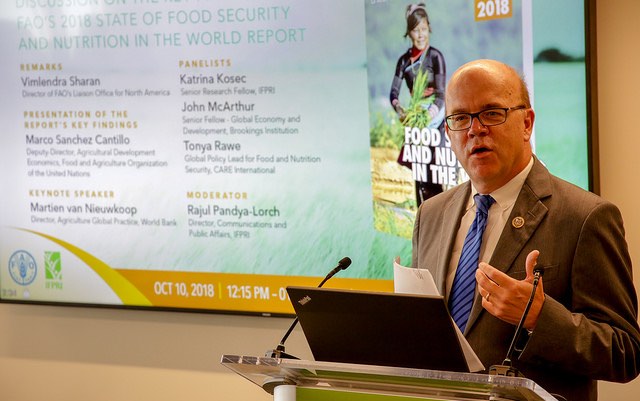Global hunger and undernourishment are rising, and climate change impacts such as frequent droughts are among the most challenging contributors to the increase, said Marco Sanchez Cantillo, UN Food and Agriculture Organization (FAO) deputy director for agricultural development economics, at an Oct. 10 event exploring key findings of FAO’s 2018 report, The State of Food Security and Nutrition in the World (SOFI).
Extreme climate impacts will hit the poor disproportionately, and IFPRI Senior Research Fellow Katrina Kosec stressed the importance of social protection in building resilience and making progress in overcoming poverty. The absence of assistance has profound effects, she said, citing her research on the Pakistan floods of 2010, which left a fifth of the country underwater.
Where government aid to flood victims was lacking, Kosec said, over a year later, flood affected individuals were less ambitious in various areas including children’s’ education, asset wealth accumulation, and taking advantage of income generating opportunities. Conversely, she said, “when there was access to the Citizens Damages Compensation Program, that gave flood victims relief—all of these negative aspirational effects evaporated.” These findings underscore the critical nature of building “shock-responsive” social protection systems as the report recommends, she said.
“I have become increasingly depressed when I read these reports … we are not seeing a bending of the curve—if anything it’s bending the wrong way!” lamented Brookings Institution Senior Fellow John McArthur. Focusing on the double burden of malnutrition, McArthur noted that five countries—India, Pakistan, China, Uganda, and Nigeria—will account for half of those undernourished worldwide in 2030, assuming business as usual, while Indonesia, the United States, India, China, and Nigeria will account for 40 percent of overweight children by 2030. The overlap, he said, demonstrates that the combination of over- and undernutrition is a global problem and we must think carefully about answers for these particular countries to make an impact where it is most needed.
“Food prices are 40 percent lower than in 2008 … this reversal in the hunger trend is occurring during a time of abundant food,” said Martien van Nieuwkoop, director for Agriculture Global Practice at the World Bank.
Examining the convergence of poverty and climate change, Nieuwkoop noted a 2016 report that said an additional 122 million people were at risk of falling into poverty due to climate change, most of them working in agriculture. Several measures can be taken to mitigate this rise, Nieuwkoop explained, boosting climate-smart agriculture can increase productivity, enhance resilience, and reduce emissions. Disruptive technologies such as plant-based meat substitutes and precision agriculture to optimize input and water use can also improve climate resilience.
The World Bank Group is doing its part by ensuring that all its operations, including agriculture programs, minimize and mitigate climate impacts, Nieuwkoop said—this includes climate and disaster risk screening, calculating greenhouse gas emissions for prospective projects, factoring the social cost of carbon in economic and financial analysis, and calculating climate co-benefits. In 2017, 45 percent of bank lending had climate co-benefits. But such institutional efforts to address climate change can only go so far, Nieuwkoop said; private sector financing is key, as agriculture is a private sector undertaking.
“We know that we can’t end hunger and we can’t end poverty from household to household; we have to address the system in which small-scale food producers and women are often operating and making decisions, and policy is a key means of doing that,” said Tonya Rawe, global policy lead for food and nutrition security at CARE International. Rawe noted that the design of one of CARE’s programs—a participatory scenario planning approach—brings together local communities, local government officials, meteorologists, and local civil society to design action plans to build climate resilience for food producers, and gives them the opportunity to voice concerns to decision makers.
U.S. Rep. Jim McGovern (D-Mass.), co-chair of the House Hunger Caucus, said that it’s essential now to “make more trouble”—increasing pressure on political establishments worldwide to compel them to invest in strategies to eradicate hunger. Progress will also depend on the know-how and resources of those who know the problems best, McGovern said: “We need to respect and support the local actors, the NGOs, the researchers and the international organizations on the front lines trying to improve the state of food security, nutrition and global health.”
Katarlah Taylor is an IFPRI Senior Events Specialist.







